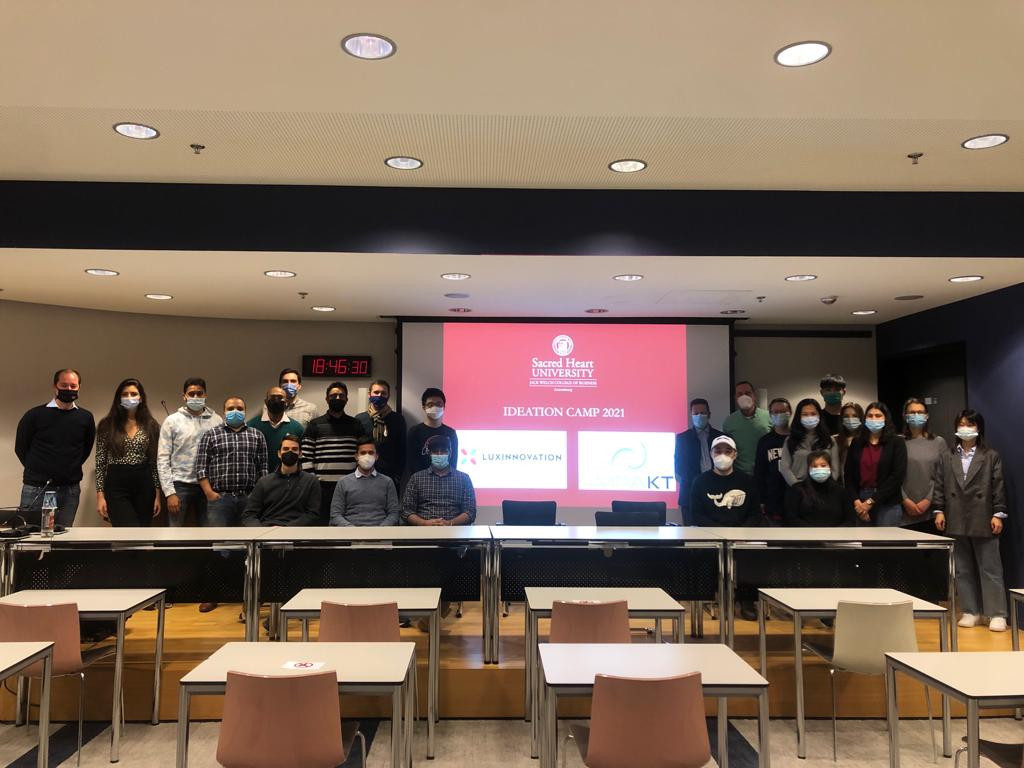I originally met with Marcus Mueller, professor of management at Sacred Heart University Luxembourg, to hear about the success of SHULU’s latest ideation camp (an exercise where teams invent and defend business concepts, in this instance for deployment in the circular construction industry). But while he did share several enticing details about the camp, the conversation also meandered into deeper waters: in explaining the philosophy behind SHULU’s new , which provided the framework for the ideation camp, Mueller exposed a fascinating set of broader perspectives on the global climate crises.
Notably, these were business perspectives.
I am, to be blunt, a capitalism/entrepreneurship sceptic. about a new aesthetic movement dedicated to separating technology from corporate dominance, the emergence of business mentalities in high schools, and I generally equate the culture of Musk-worship with planet-killing resource extraction, the widening wealth gap, and other ills—so I was surprised when a management professor at a business school expressed a set of revolutionary beliefs not wholly dissimilar to my own.
“We have turned into a Homo Deus,” he said at one point, speaking about humanity in general. “We think that we are God and that we are, you know, ruling nature.”
Then he shook his head. “It’s never going to happen.”
Toxic individualism
Such a sentiment is hardly new, but it’s not (at all) the usual line heard from the business world. Yet Mueller and his sustainability platform appear to be making an honest, tangible effort to promote this mentality, i.e. one of humility, in an entrepreneurial context.
The first challenge is to disentangle what sounds like an oxymoron. If you share any of my scepticism, then mixing humility and startups will sound absurd: the business world’s culture of individualistic gain and corporate competition is fundamentally at odds with any attitude of sharing, sacrifice, or communality. Hell, the word “communality” comes dangerously close to capitalism’s sworn enemy—one hesitates to even think about them together.
But Mueller nevertheless named individualism as one of the business world’s problems. “When you look around,” he commented, “the initiatives that are currently being promoted are based on three kinds of levels. One is fear. One is control. One is individualism.”
He quickly explained that he doesn’t mean it’s bad for entrepreneurial initiatives to be individualised—that’s normal, at least for now—but rather that the field is fragmented with too many focal points. He named circularity, sustainable finance, supply chain issues, and other parallel but unintegrated angles. “It’s all over the place,” he concluded. “We’re losing a lot of time because everyone is doing his or her own thing.”
On a much larger stage, however, the question of individualism is tied up in the psychology of money. “A lot of people in the Western world, or the capitalist world, have become very individualistic,” he pointed out. “People think: ‘Once I have money, and more money, and even more money… then I need fewer and fewer people; I’m less interdependent.’ And that’s a complete myth. That originated somewhere in the ’70s, ’80s, ’90s, with hyper-capitalism.”
“Which is not to say we need a capitalist revolution,” he hedged. “Capitalism itself isn’t the problem. It’s the way we’re handling it.”
For Mueller, rather than a revolution, our society needs to rethink its relationship with money: namely, money should be a means to an end rather than a goal in itself. “We need to form a new narrative around the way we live, and how we live together.”
And yet we can’t live inside a theory
I asked the professor what real-world actions the business world can take to help form that new narrative of living together. He outlined two strata, the personal and the institutional.
Regarding the personal, SHULU’s methodology is as simple as obliging pupils to collaborate. Mueller estimated that 60% or 70% of the work his students do is in teams. For the ideation camp, participants were divided into groups of four or five and learned, with the help of coaching and support, how to work together efficiently. “What do you know about yourself? What do others need to know about you so you can become an efficient team? Who is best at doing what? What do you want to learn? How can you collaborate? We’re very effective at turning individuals into teams,” said Mueller.
On the institutional level, Mueller explained that a new movement is emerging: B Corps. To become certified as a B Corp, a business must meet a certain set of social, environmental, and transparency criteria. The “B Corp Declaration of Interdependence” embodies its ethos, a set of tenets that define a new type of corporation that is, , “purpose-driven and [which] creates benefit for all stakeholders, not just shareholders.”
“It’s fuelling the idea,” said Mueller, “that, individually, we’re not going to make it.”
Even when two or more B Corps are operating in the same industry, the professor continued, with the same products and the same customers, they collaborate.
What that really means and looks like isn’t immediately clear to me, and would need further analysis. But it’s an encouraging, if shocking, suggestion. Even better, Mueller thinks that B Corps have momentum: “There are close to 5,000 B Corps now… but 100,000 people are currently going through the certification process. It’s a big movement.”
In Luxembourg, there are just three B Corps: Ramborn, Innpact, and Seismic. For now, you cannot yet get a so-called B Corp “mission lock” in the grand duchy, a kind of stamp or verification of the business plan. Mueller reported, however, that the movement is “currently in close consultation with the Luxembourg government to bring it here” as well.
If not here, where?
Above and beyond B Corps specifically, the professor considers the grand duchy to be in a unique position to make a major impact on how businesses can help fight the climate crisis. But the problem, he pointed out, is a lack of holistic thinking. “Most of the talk in Luxembourg is about carbon footprint and how we’re going to reduce it,” said Mueller. “But carbon footprint is not our main problem.”
Other issues include resource scarcity, exploitation, chemical pollution, water shortages, and others. “We think that if we regulate our industry here,” he said, “that if Luxembourg reduces its carbon footprint by 70%, 80%, 90%, then that’s going to make a difference?”
He shook his head. “That’s insane.”
His point is that the whole planet is in it together, and Luxembourg is, comparatively speaking, a drop in the bucket. Japan is building 26 new coal-fired power plants, he pointed out, and the percentage of coal as an electricity source actually rose last year by 9%.
He thus advocates a broadening of the country’s attention beyond (just) reducing its carbon footprint. “What role does Luxembourg really want to play?” he asked. “We have two of the most significant resources in creating solutions: capital and brainpower.”
“And the question is,” he continued, “how are we going to use them? Are we going to use the brains of smart people to put up more regulation to reduce the carbon footprint in this country of 700,000 people? Or are we going to combine the two [capital and brainpower] to enable companies to innovate, to create technologies that can then be used by the Japanese and the Chinese and the Americans and so on?”
Small but concrete steps
That brings us to the SHULU’s latest ideation camp, which unlike its previous iterations focused on a social problem: namely, how to improve the circular building industry in Luxembourg. Five teams participated, and they came up with a myriad of business plans.
One of them proposes an AI-driven online platform that connects the owners of “non-living spaces” (schools, garages, malls, etc.) with users who could potentially use those spaces for community events outside business hours. Another team has designed a platform that would act as a material bank for local buildings: in other words, like the nutritional facts on an item at the grocery store, the raw ingredients of new constructions would be tallied. A third has developed an online marketplace for buying and selling used construction products and materials. A fourth has proposed a certification process for materials that would assess their potential for reuse—so as to stop them from being immediately discarded. And the final team is addressing housing, working on a “house within a house” concept in which unoccupied or too-large residential spaces in Luxembourg can be used more efficiently.
The camp itself was run in partnership with Luxinnovation, but Mueller takes it as a sign of that organisation’s honest excitement over the results that they accepted all five projects for their “idea-to-flagship” pipeline. In other words, all five ideas have a real shot of making it to the marketplace. “We have now combined two of the those five into a consulting project,” Mueller explained, “so our students are working on how to implement these two ideas.”

Participants in SHULU’s ideation camp proposed concepts like repurposing underused real estate in Luxembourg and making a “nutrition facts” label for the various materials used in individual buildings. Photo: Sacred Heart University Luxembourg
In closing
Imagining and designing new futures is hard mental work, and realising them on societal, national, and worldwide scales is harder still. Ideas tend to die without cultural momentum sweeping them along, and though I remain uncertain about how fundamentally—and quickly—we can alter our present norms of toxic hyper-capitalism, it is encouraging that, finally, entrepreneurs () and business professors are talking about it.
